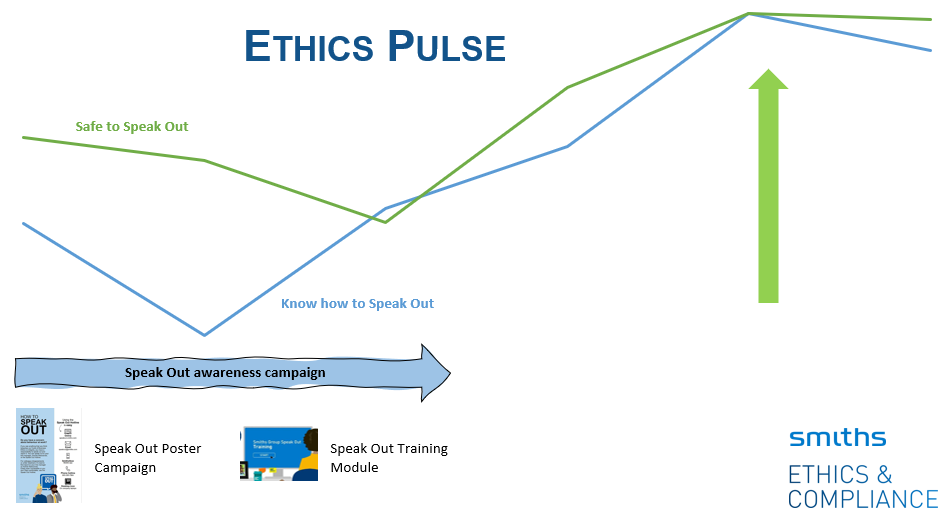Tags: Speak Up, Monitoring & Accountability
In the next blog of the Innovating Business Ethics series, Richard Hanson, Associate General Counsel - Ethics & Compliance shares how Smiths Group plc use surveys to identify and understand trends in employee views.
Do you know the mood of your employees like a political pollster?
A different type of survey to understand trends in employee views as they change over time.
Most modern organisations use surveys to understand their workforce, but they are often complex, expensive and just a snapshot. A different approach is taken at Smiths – an approach that is simple, cheap and shows what is trending in employee sentiment.
Wanting to get a reading on employees’ perceptions of our ethics and compliance activities, we use a simple survey. Asking only seven questions, it is quick and easy to answer (and to analyse the results). Using our learning management system, we automatically assign the survey to ask different employees every day (progressively covering the population over the course of a 2-year period).
We ask questions about whether leadership live our code, and whether employees know how to use our confidential whistle-blower hotline, whether they trust the line and whether they would use it if they saw unethical business conduct.
Mood in the room
Unfiltered by layers of management and anonymous, employees answering the survey let us know their views on ethics and compliance. Using our data analytics, we can slice-and-dice the information to gauge what the mood in the room is across different divisions, regions, and countries.
We can now identify best practices (and push it to where those learnings are needed most) by comparing and contrasting, e.g. engaging the business to ask: what are they doing so well in Malaysia? Can our Thailand sites adopt it?
Looking for potential improvements, we targeted employee awareness of the confidential whistle-blower hotline. Comparing this with peers and IBE data, we were healthily above benchmarks. 85% of employees said that they knew how to access the whistle-blower line. Believing that improvement was still possible and vital to our compliance success, we agreed with our stakeholders to launch a new awareness campaign. We could track the before, during, and after scores to measure success.
Trending
Day-by-day we track the trends in employee perception. Seeing our own performance in almost real-time, we can track the impact of our interventions.
Launching a whistle-blower hotline awareness campaign, we could track the impact of our poster campaign and digital awareness training across time and geography. We can identify what compliance activities have the most impact.
Watching the trends, we saw improvements in whistle-blower line awareness. 93% of employees said they knew how to access the whistle-blower line (up from 85%). Positive impacts were found on all other survey questions too. Believing that the line is safe to use is another essential measure. 94% of employees felt safe to use the whistle-blowing line (up from 89%).
Anticipating and tracking a waning of impact in our poster campaign, we can better time a refresh of posters. No longer ‘flying blind’ but watching the trends, we can accelerate or postpone our next awareness campaign for when and where it is needed most, increasing impact and conserving resources.

Stakeholder recognition
Insights are valuable. The Smiths Ethics & Compliance team provide information that others want. More than informing our own compliance programme, divisional compliance professionals and business leaders observe their own organisation broadly and deeply at a glance.
Smiths’ CEO includes Ethics Pulse at the top of his own personal scorecard. Business leaders use Ethics Pulse in preparing for regional meetings. Employees are more engaged in training sessions when we can show how their own perceptions compare with other areas of the business.
By providing value, compliance is increasingly seen as an aid to doing business well. This led to more engagement with stakeholders, mutual understanding, and more impactful compliance practices.
Make risk analysis and compliance interventions powerful by making surveys shorter, easier and regular.
Data is just data. Use it to form insights, engage with stakeholders, identify best practices, and target resources to when and where they are needed most.
Author

Richard Hanson
Associate General Counsel - Ethics & Compliance, Smiths Group plc
Richard Hanson is Ethics & Compliance Associate General Counsel for the engineering multinational Smiths Group plc. Following obtaining a Law & Politics degree, Richard joined the BAE Systems’ graduate management training programme before returning to the law and qualifying as a solicitor. He has experience working for FTSE 100 companies in commercial, legal and compliance roles across EMEA and APAC. He specialises in business ethics and investigations, third party risk and anti-corruption, data analytics and compliance systems design.

